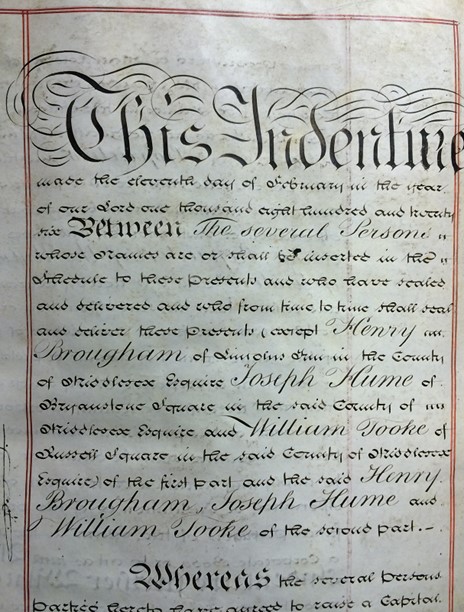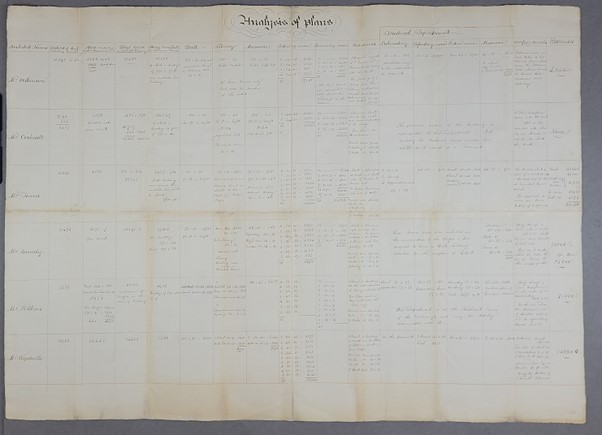‘Very coarse articles’ – celebrating UCL’s institutional archive
By Colin Penman, on 8 February 2022
February 11 is generally accepted as UCL’s ‘birthday’, the date in 1826 of our founding instrument, the Deed of Settlement. This document establishes a society, called ‘The Proprietors of the University of London’, to set up an Institution with the object of ‘affording to young Men … adequate opportunities for obtaining Literary and Scientific Education at a moderate expence’. That’s exactly what our founders did, disregarding a very snooty letter to The Times on 2 November 1825, which suggested ‘There should be something of a prohibitive duty in the way of expense, to prevent the admission of very coarse articles’.

UCLCA/1, Deed of Settlement
This is an image of the first page of the Deed of Settlement, held in the UCL institutional archive, which I manage. This archive is of course just one part of Special Collections, but I want to use this anniversary to bang our drum or blow our trumpet (or both).
When those who know us think of our Special Collections, they may not think first of the archives of UCL itself: after all, we have other, flagship collections which rightly claim a lot of scholarly and popular attention. But I’d argue that our own archive is not only worthy of some of that attention, it’s vital to UCL’s understanding of itself, and the way we present ourselves to the world.
For a start, it can be a useful corrective to the stories we tell about UCL. For example, for a long time you could read on our website and social media that UCL was ‘the first university in England to admit women on equal terms with men’. You rarely see that claim now, because it simply isn’t true. It’s a lot more interesting than that, and you can trace the complex truth in the College archive through items like the College Calendars, which tell us:

College Collection A 3.2, p. 2
That is, if you were a prospective student in the second half of the 19th century and happened to be a woman (and not connected to a man at the top of the institution), you needed the approval of the Lady Superintendent of Women Students. Similarly, a look at plans of the Wilkins building from this time shows separate spaces for women, with the Union Society (men only) on the left, and women’s space on the right, in the South Wing:

College Collection A 3.2
and the archives of the Women’s Union Society (WUS) attest to a separation of male and female students that lasted right up to 1946.
The archive is also increasingly used as a resource in UCL’s teaching. This term we are taking part in the Institute of Education’s Worlds of UCL module, which uses the history of UCL and the Institute to explore topics in the history of education. Last week, students were using items from the archive – specifically a blazer, medals and magazines – to think about student culture and identity, and how these have evolved over time.

Last term, we contributed to the Bartlett School’s Architecture & Historic Urban Environments MA module on Surveying and Recording of Cities, using our building plans, like this, one of Thomas Hayter Lewis’s plans for the South Wing of the Wilkins Building,

UCLCA PLANS D5
as well as a remarkable document with the prosaic title of ‘Analysis of Plans’. It was the Bartlett’s Dr Amy Spencer, who has just completed her PhD on UCL’s architectural history, who pointed out the significance of this item, slightly unnoticed in our vast collection of College Correspondence. It is in fact a comparison of the bids received (around the time of the Deed of Settlement, in early 1826) for the building for the new university. Due to its significance, and to make it safer to handle and display, we decided to ask our wonderful conservators to stabilise it for the future. Now it has a new enclosure of its own, and will be stored flat, instead of being folded four times:

UCLCA/CORR/1167/15
These are just a few examples of how we’re getting the archive out there, and developing it for the future. Much more cataloguing is needed, and we’re working on that, but we also have a wealth of digitised material which is so vital in research and teaching support, particularly throughout Covid lockdowns, when nobody could access the collections physically. For this, we have to thank our Special Collections digital curation colleagues, and UCL Educational Media Services.
Meanwhile, the archive is being developed in innovative ways. Although we occasionally accept donations from people formerly connected with UCL, the vast majority of the archive consists of the administrative records that you would expect to find in any large educational establishment – minutes, correspondence, registers and so on. These are vital to our understanding of the story of UCL. But with the records of individuals, we can include voices that are missing from that story. If you were a student or staff member at the Slade School, for example, there’s still time to send something to Slade 150: Letters to the Archive. And the Generation UCL project will make a more wide-ranging contribution as a record of recent student life in London.
After all, our 200th birthday is only four years away!
To learn more about UCL Records, check out our main page.
2 Responses to “‘Very coarse articles’ – celebrating UCL’s institutional archive”
- 1
 Close
Close



Dear Colin,
Thank you for a fascinating piece of story about UCL. In my first greetings to my UG and PGT students, I always say how proud I am working at the university that was a first one to open its doors to women and now I know a bit of reality of the past. UCL still has welcomed women although they were perhaps only a few and elite while other universities did not.